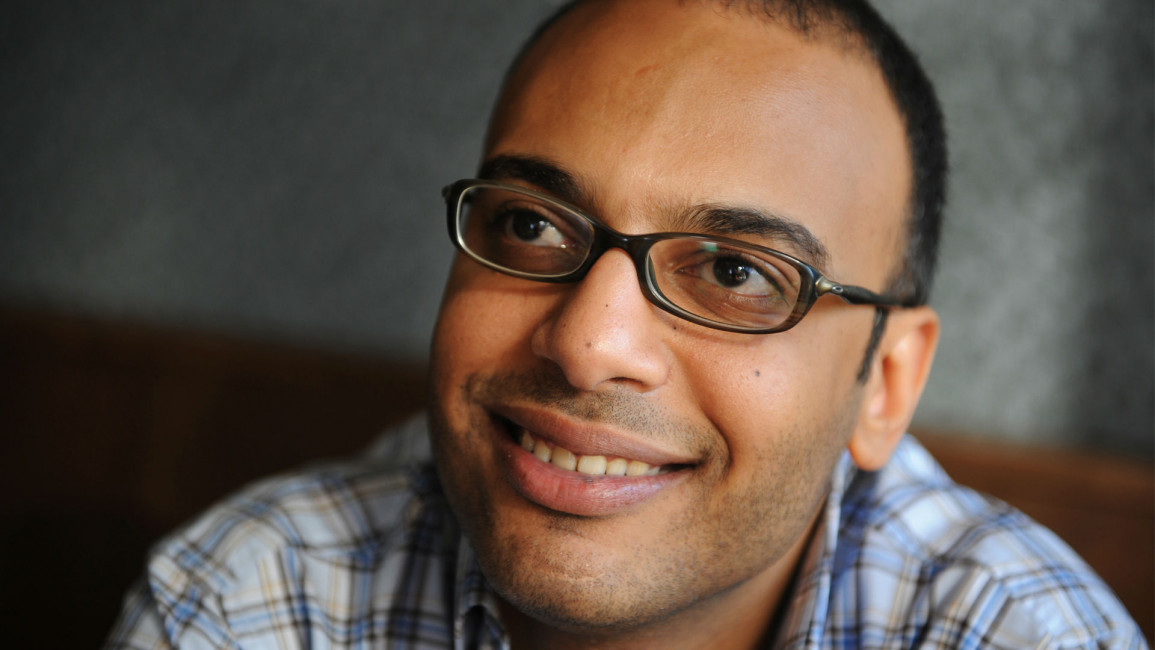
Egyptian authorities send a message: No journalist is safe
Now that the journalist Hossam Bahgat has been freed by the Egyptian authorities, we can look at the bigger picture of what his arrest means for Egypt as a whole.
Like most other journalists, in the first few days after his arrest I could not see beyond the detention of a respected colleague persecuted for doing his job.
His arrest fuelled deep-seated insecurities about the risks taken by those in this profession.
But he is out - and it now appears that both the timing and circumstances of his detention are ominous indicators for journalists in Egypt.
The arrest of Bahgat, one of Egypt's best investigative journalists and the founder of one of the country's most effective human rights organisations, the Egyptian Initiative for Personal Rights (EIPR), was as disturbing as it was infuriating.
| I feel the [media] are neither conscious nor knowledgeable, nor anything at all - President Abdel Fatah al-Sisi |
After spending a day being interrogated by military intelligence, he was informed he would be charged with spreading false news and harming the national interest, and would spend three days in custody.
In a statement he issued after being released from his brief detention at an undisclosed location, he said he rejected "the criminalisation of journalistic work, the use of the Penal Code to imprison journalists and the trial of civilians in military courts".
The charges relate to a recent report by Bahgat on the news website Mada Masr on the secret trial of 26 soldiers for allegedly attempting to stage a coup.
What were the authorities trying to prove?
While his fate is yet to be decided, Bahgat got off relatively lightly. Many other journalists have been treated to much longer pre-trial detentions. His high profile and significant local and international support probably helped his cause.
But this episode capped ten days of strong messages to journalists that there are real consequences for breaking ranks with the regime.
It all started with an angry speech from President Abdel Fatah al-Sisi, implicitly threatening the media. Referring to broadcasters who criticised his handling of the Alexandria flooding, he said repeatedly: "This is inappropriate."
He continued: "I feel the [media] are neither conscious nor knowledgeable, nor anything at all. All they do is hold a microphone, or write in a newspaper. No. No, we will lose the state if this continues."
This was by far the most forthcoming condemnation of the media from Sisi himself. Ironically, the only individual he singled out for criticism during his tirade was a television presenter among his most loyal adherents in the media.
The outburst was more of a reaction to the increasing - though still mostly timid - criticism directed at the president himself.
| Read more: Activist reveals details of his military interrogation |
Egypt's media are also covering the incompetence of many government departments, almost on a daily basis, and extensively reported the inability of the state to deal with crises such as the flooding in Alexandria.
It seems as though the president is sick of this negative coverage. Given his extremely patriarchal and centralised style of rule, all of this criticism ultimately leads back to him.
Only a few days after this speech, a television presenter working for a public broadcaster was suspended for criticising the government's response to the flooding in Alexandria.
However, the most serious thing she said was that the president should hold negligent officials accountable.
Putting the powerful in their place
| The sense is that the journalistic community are being given a clear message: 'no one is safe' |
On the same day of Bahgat's detention, businessman Salah Diab and his son were arrested in relation to a four-year-old corruption case and for possession of illegal weapons.
Diab is an oil, agriculture and retail tycoon, but also has a controlling stake in the most widely circulated private newspaper in the country.
He has also financially supported many of the president's initiatives.
The manner of his arrest was clearly intended to send a political message. Instead of receiving a summons, special forces raided his house at dawn. Journalists were on hand to document the moment, to take pictures of him in handcuffs standing outside an armoured vehicle on his own driveway.
The entire scene seemed staged, a bit too much for the arrest of a senior citizen who certainly did not pose any immediate physical threat to society.
Diab's newspaper, al-Masry al-Youm, has been increasingly critical of the government after a recent editorial shakeup.
His arrest was a cautionary tale for other rich and well-connected businessmen.
Among the journalistic community in Egypt, the sense is that they are being given a clear message: "no one is safe."
Anything less than consistent sycophancy when reporting on the head of state or on the military means you might be targeted. But while Ban Ki-moon spoke on Bahgat's behalf, most journalists would be lucky to see any pressure at all put on the authorities to release them if they were arrested.
Mohamed ElMeshad is a journalist and a PhD candidate at SOAS, focusing on the political economy of the media. He extensively worked in Egypt, Bahrain, West Africa, the UK and US. Recently, he contributed to the Committee to Protect Journalists' book, Attacks on the Press (2015).
Opinions expressed in this article remain those of the author and do not necessarily represent those of al-Araby al-Jadeed, its editorial board or staff.




